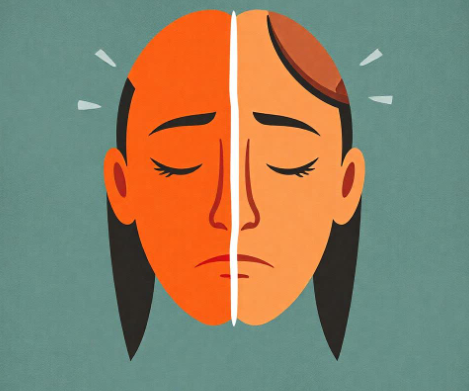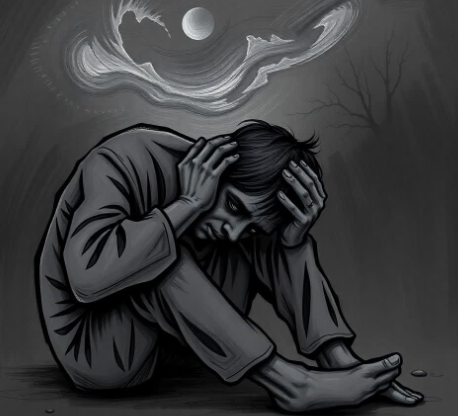Depression: Biological or Psychological? Unpacking the Debate and the Scientific Evidence
(Source: By Allan Leventhal)
Introduction: Challenging the Prevailing Narrative of Depression
For decades, the dominant public and professional understanding of depression, the most common psychiatric diagnosis, has been shaped by a seemingly straightforward narrative that depression is fundamentally a physical illness, akin to other medical conditions, with a genetic or physiological origin. This perspective often posits that antidepressant drugs are effective because they correct a verified biological imbalance, specifically a "chemical imbalance" in the brain.
This prevailing belief, largely propagated by institutions such as the National Institute of Mental Health (NIMH) and the psychiatric profession, contrasts sharply with earlier conceptualizations. For most of the 20th century, depression was primarily viewed through a psychological lens. NIMH once considered depression a rare, self-limiting disorder with a highly favorable prognosis, often resolving without specific intervention. Dean Schuyler, then head of NIMH’s Depression Section, famously stated that most depressive episodes "will run their course and terminate with virtually complete recovery without specific intervention." Indeed, a 1968 psychiatric textbook reported a lifetime depression diagnosis rate of only 6% in the U.S. population, with psychological, not medical, treatment being the norm.
The "Medical Revolution": A Paradigm Shift Without Scientific Basis?
The radical shift in understanding and treatment of depression, often termed psychiatry’s "medical revolution," began in 1980 with the publication of the American Psychiatric Association’s (APA) third edition of its diagnostic manual, DSM-III. This manual's release was accompanied by psychiatry’s fervent promotion of the chemical imbalance theory and the advocacy of medical treatment, primarily through antidepressant drug prescriptions. This marked a profound rejection of the previous psychological viewpoint.
Since this "revolution," the landscape of depression has dramatically altered:
· The lifetime diagnosis rate for depression has surged fivefold, with women disproportionately affected.
· Tens of millions of people now take antidepressant drugs daily.
· Alarmingly, the prognosis for depression has worsened, with frequent relapses becoming common.
Assessing the implications of this changed conceptualization and the demonstrably poorer treatment outcomes requires a critical examination of the scientific credibility underpinning psychiatric claims, especially when compared to medical claims for physical illnesses.
The Elusive Biological Basis: A Half-Century of Failed Research
While an abundance of scientific research robustly supports the biological causation and medical treatments for numerous physical illnesses, the same cannot be said for psychiatric claims regarding common mental disorders, including depression. Aside from a handful of conditions, such as Down syndrome, dementia, and organic disorders related to alcohol and drug abuse, no commonly diagnosed mental disorder, including depression, has been definitively found to be of biological origin. Furthermore, contrary to popular belief, outcome research has consistently failed to prove that antidepressant drug treatment for depression is highly effective.
This isn't due to a lack of effort. Over five decades, NIMH has invested tens of billions of research dollars in an exhaustive search for genetic, neurological, or physiological evidence for depression. Their efforts have, to date, failed. Any biological (e.g., genetic) evidence discovered has been notably weak, insufficient to account for the disorder adequately.
A striking example of this scientific void came in the early 2000s when a group of psychiatrists proposed that the next diagnostic manual, DSM-5, would diagnose mental disorders based on verifiable brain abnormalities. Tasked by the APA to implement this vision, they ultimately failed to do so. They could not physiologically, neurologically, or genetically distinguish one mental disorder from another, nor could they specify biomarkers for any of them. Even the statistical reliability of their diagnoses (kappa values) proved worse than those for DSM-III.
Consequently, when DSM-5 was published in 2013, it reverted to the descriptive stance of DSM-III, explicitly avoiding the specification of any biological causation for the disorders. Robert Spitzer, who led DSM-III's construction, even admitted he knew of no such biological evidence beyond a few specific disorders. Yet, despite this lack of scientific backing, psychiatrists have continued to use the DSM-III and its successors to promote the contention that depression is a biological disorder.
Antidepressant Effectiveness: A Critical Examination of the Evidence
Beyond causation, the efficacy of antidepressant drug treatments for depression also faces significant scientific challenges. Research data suggests that not only are these drugs not highly effective in the short term, but long-term use, which is how they are most often prescribed, may actually lead to a worsening of depression.
Early research on the antidepressant imipramine found no significant benefit over placebo in the short term (three months). More tellingly, after 18 months of treatment, drug-treated patients showed no more benefit than placebo groups, had fewer symptom-free weeks, higher relapse rates, and a greater need for additional treatment. Disturbingly, patients treated with a placebo, and even those not treated at all, fared better than those on the drug.
For today's favored antidepressants, SSRIs, psychologist Irving Kirsch, a leading expert on the placebo effect, re-analyzed data submitted to the FDA for their approval. He concluded that the FDA had erred, finding that the drugs produced only a placebo effect, not a true drug effect based on short-term measures. International studies echo these findings: the UK’s health department found antidepressants no more helpful than placebos short-term, and significantly less helpful long-term. A Swiss study showed that long-term psychological treatment had substantially better outcomes than SSRI treatment, and that patients on SSRIs fared worse than those receiving no treatment.
Even NIMH’s own multi-million dollar STAR*D study (2006), the largest ever designed to substantiate the biological basis of depression and SSRI efficacy, yielded results that contradicted the claims. Short-term, only 30-35% achieved remission, consistent with a placebo effect. Long-term (12 months), the remission rate plummeted to just 3%. Crucially, STAR*D investigators are accused of statistical manipulation and research fraud to falsely claim nearly 70% success, a fabrication that NIMH, psychiatrists, and the media have widely disseminated. This misrepresentation has led the public to believe these drugs are highly effective, despite evidence to the contrary. Furthermore, STAR*D also failed to support the theory that different antidepressant drugs could be "matched" to different forms of depression, as all drugs produced the same limited effect.
The very foundation for SSRI prescription—the "chemical imbalance theory," asserting depression is caused by a serotonin deficiency—has also been soundly debunked. UK psychiatrist Joanna Moncrieff's research, employing five different biological analyses, found no support whatsoever for this theory.
The Psychological Alternative: A Scientifically Validated Path
Psychiatry's "medical revolution," which has profoundly influenced public belief, is fundamentally contradicted by scientific testing. Follow-up data even suggest that the medicalization of depression, rather than alleviating it, may be contributing to its worsening (as argued in Robert Whitaker's Anatomy of an Epidemic and Laura Delano's Unshrunk). This starkly contrasts with the rigorous scientific standards applied to physical illnesses, which have yielded numerous successful treatments.
The erroneous public belief in a biological basis for depression and the efficacy of antidepressants is perpetuated by drug company hype, misplaced trust in doctors, societal popularity, the placebo effect, and the misinterpretation of adverse drug effects as relapse. It is not based on biology or genetics.
The true scientific understanding of human behavior, in contrast to lower animals, is largely rooted in learning, a psychological process. While the human brain provides the biological substrates (memory, reinforcement systems, cognition), our complex behaviors are primarily learned. Behavioral principles, developed over decades of rigorous psychological research, explain how behaviors are created, maintained, and modified. This includes understanding how commonly diagnosed mental disorders, such as depression, arise as learned dysfunctional behaviors, and crucially, how they can be unlearned using the same scientific principles.
Historically, 20th-century psychology offered two main explanations for depression:
· Psychoanalysis: While widely accepted, its Freudian theory of unconscious childhood conflicts was speculative and resisted scientific testing, relying on subjective case histories. However, patients treated for depression at that time primarily received relaxation and exercise, with "off-the-charts" favorable outcomes compared to today. This success might be attributed to fewer misdiagnoses of normal sadness and the absence of harmful drug interventions.
· Behavioral Psychology: Emerging from psychology laboratories in the early 1900s, this approach emphasized empiricism and data-driven theories. Behavioral psychologists, akin to Darwin and Mendel, conducted studies on learning, first in animals and then in humans, demonstrating that dysfunctional behaviors are learned similarly to functional ones.
Key findings of behavioral science regarding depression's causes include:
· Adverse environments
· Dysfunctional responses to negative conditions
· Traumatic experiences of loss
Behavioral research has illuminated how disorders are learned through principles like Pavlov's classical conditioning (involuntary physiological responses) and Skinner's operant conditioning (behavior shaped by consequences). A critical discovery is that behaviors can be reinforced by short-term positive effects, even if long-term effects are negative, a principle particularly relevant to avoidance behaviors underlying many disorders, including depression. Importantly, these deviant behaviors can be eliminated (cured) by applying the same principles to modify dysfunctional learning, giving rise to behavior therapy.
Empirically-Derived Psychological Treatments: A Track Record of Success
The success of empirically derived psychological treatments predates psychiatry’s "medical revolution":
· Systematic Desensitization (Joseph Wolpe, 1960s): Based on laboratory studies of fear conditioning and extinction, Wolpe, a psychiatrist disillusioned with his training, developed this straightforward behavioral treatment for phobias. Despite initial alarm from dominant psychoanalysts who feared "symptom substitution," Wolpe demonstrated its effectiveness without adverse effects, establishing it as the treatment of choice for phobias.
· Exposure and Response Prevention (Edna Foa): This behavioral treatment for Obsessive-Compulsive Disorder (OCD), also rooted in learning research on eliminating avoidance behavior, remains the best treatment for the disorder.
· Dialectical Behavior Therapy (Marsha Linehan): Derived from psychological research, DBT is now considered the best treatment for Borderline Personality Disorder, a condition once deemed intractable.
· Cognitive-Behavioral Therapy (CBT) for Depression (Aaron Beck): Beck, a psychiatrist, developed CBT based on the understanding that depression stems from faulty assumptions, beliefs, and behaviors. He described his treatment as educational, not medical. In stark contrast to antidepressant drugs, psychological treatment for depression is significantly more effective than a placebo, significantly more effective than drug treatment, and its effectiveness increases over time, likely because patients integrate learned lessons after therapy concludes.
· Behavioral Treatments for Addiction: Treatments for cocaine and amphetamine addiction based on operant conditioning research are recognized as the most effective available.
Despite receiving vastly less funding from NIMH compared to drug research, behavior therapy has proven to be the most effective treatment for depression and other commonly diagnosed mental disorders. While more research is needed to further refine its delivery and improve effectiveness, there is strong reason to believe that increased NIMH funding for behavioral research would lead to even greater advancements.
The Scientific Truth: A Contrast in Standards
The widespread application of behavioral psychology’s findings beyond therapy, from Google's app design and Apple's iPhone interfaces to political consulting and the very strategies employed by drug companies (who spend billions to obscure the superiority of behavioral treatments), amply substantiates the value and generality of this research. These psychological principles, like gravity, are objective methodologies available to benefit individuals, not just commercial and political interests.
The scientific record is unequivocally clear: the claims made by psychiatric authorities regarding the biological basis of depression and the supposed value of antidepressant drugs are not supported by scientific testing. NIMH and psychiatry have influenced public belief through rhetoric, not science. While physical illnesses have physical causes and require medical treatment, depression (and other common mental disorders) are fundamentally different. An abundance of scientific evidence confirms that depression is of psychological origin and should be treated psychologically with behavior therapy, not medically with antidepressant drugs. The public is paying a heavy price for this significant misguidance.
Labels: Depression: Biological or Psychological? Unpacking the Debate and the Scientific Evidence






0 Comments:
Post a Comment
If you have any doubt, please let me know
Subscribe to Post Comments [Atom]
<< Home